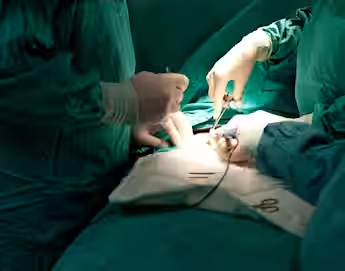After the initial repair, William experienced severe abdominal pain. The medical team investigated, drained his wound and treated the infection with antibiotics, which did not work. Eventually, they decided to operate, with a plan to remove only part of his mesh. William was told this would be a relatively minor operation, which they hoped to be able to perform laparascopically.
During the operation, the surgeons removed part of the mesh as planned, but did not explore William's abdomen to check for further signs of infection.
When William woke from the surgery, he was shocked to find a large open wound across his abdomen. As the weeks and months past, his condition did not improve and he continued to experience wound infections and developed intra-abdominal sepsis. His wound refused to heal and remained open (to this day he suffers from nightmares of rats eating his insides) until he underwent a further procedure to remove the rest of the mesh six months later. At this point, the rest of the mesh had eroded into his bowel and he required a bowel resection.
The events ruined William's life. He now lives with a large defect and scar on his stomach from the multiple surgeries. He suffers from PTSD from living with the open wound for many months. He has been unable to work since the operation and was medically retired a year or so after his injury.
William approached Jonathan two years after the index events and he instructed a team of experts including a general surgeon, radiologist, psychiatrist and pain specialist to consider William's case. It became clear that the experts had many concerns about William's care and Jonathan pleaded a case on his behalf to the effect that:
- The type of mesh that William had in his abdomen required that it was removed in full once it had become infected; partial removal was not appropriate because it carried a very high risk of reinfection;
- Furthermore, he was not properly advised that the option of a full mesh removal even existed, nor about the risks of partial mesh removal;
- Had he been offered the full mesh removal and had the relevant risks been explained to him, he would have declined the partial removal and proceeded with the full removal.
The hospital denied these criticisms, primarily suggesting that the partial removal was the appropriate treatment option. But Jonathan and his team were able to demonstrate that the type of synthetic material William's mesh was made of was almost certainly going to result in a continuing mesh infection if only part of it was removed and, crucially, they were able to support this with medical literature.
Eventually, the Defendant Trust agreed to meet to discuss a possible settlement. At the first meeting, no agreement was reached. However, shortly thereafter the Defendant's expert admitted that he had misunderstood exactly which type of mesh had been used to repair William's hernia. Following that admission, Jonathan was able to negotiate a high-six figure settlement.
William was grateful to Jonathan, although both agreed that the fundamental error made by the Defendant's team had dragged the case on unnecessarily for several years:
"I would like to express my appreciation for all the tireless work you carried out on my case over the years. You always kept me updated and informed on the progress of my case and especially when critical issues arose. You along with your great team were friendly, professional, and fair when discussing and collecting my information and were able to put me at ease. The positive result of my case is a testament to your professionalism, tenacity and honest in fighting for the best result."
* name changed
For further information about surgery negligence claims and medical negligence claims, please call Jonathan Zimmern on 03304606779 or email jonathan.zimmern@fieldfisher.com.
Alternatively
- You can speak to our medical negligence lawyers on freephone 0800 358 3848
- e-Mail them at personalinjury@fieldfisher.com
- Complete the short online enquiry form
All enquiries are completely free of charge and we will investigate all funding options for you including no win, no fee.

